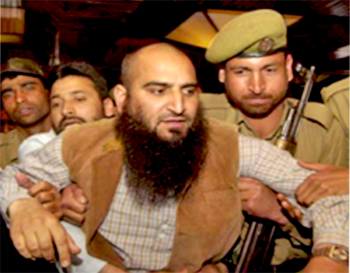New Delhi, Mar 10: Opposition parties today sought to corner the government over reports that the Jammu and Kashmir government was planning to release 800 more separatists and sought to know if the state's Governor has mentioned this in his report to the Centre.
After Naresh Agarwal (SP) and others raised the issue in Rajya Sabha, Finance Minister Arun Jaitley said government was ready to respond to any specific case brought to its notice.
 When the House met, Agrawal said he had given a notice under Rule 267 for suspension of business to take up the issue of reports claiming that J&K Governor in a report to Centre has said the state government planned to release 800 more separatists in a day or two.
When the House met, Agrawal said he had given a notice under Rule 267 for suspension of business to take up the issue of reports claiming that J&K Governor in a report to Centre has said the state government planned to release 800 more separatists in a day or two.
He wanted to know if the Governor had sent any such report and whether he had signed the release order of separatist Masarat Alam. The Hurriyat leader was released from prison three days ago.
Agarwal also wanted to know whether the Centre could give an assurance that no more separatists will be released by the Mufti Mohammad Sayeed government in Jammu and Kashmir.
Rajeev Shukla (Cong) also sought to know if the orders for Alam's release were signed by the Governor and if they were issued when the state was under President's rule.
AIADMK members claimed 10,000 separatist prisoners are about to be released in Jammu and Kashmir.
Jaitley said Home Minister Rajnath Singh had yesterday made it absolutely clear that he had certain reservations about the report received from the state government on the release of one separatist and had sought more information.
Deputy Chairman P J Kurien rejected the notice for suspension of business since the same issue was discussed threadbare yesterday and Home Minister had given his reply.
Kurien said the SP leader could give notice under different rules if he had any new information on the issue.
Taking strong exception to statements that 10,000 prisoners are being released, Jaitley said, "are you telling the world that we have kept 10,000 political prisoners... you have to have some sense of responsiblity (while making such statements)."
Alam had several cases against him and was granted bail by court in some of them, he said, adding the government will respond if any specific case of another separatist being released is brought to its notice.
Maintaining that the government will "find out and give response" if a specific case was given, he said "lt a notice be given with authentic facts. The House cannot be media-driven."
Agarwal however continued to insist on his notice and found support from some Congress members.
The issue consumed nearly half of the Zero Hour before order was restored and other issues taken up.
Earlier CPI(M) member P Rajeeve objected to the listing of the Motor Vehicles (Amendment) Bill, 2015 and Coal Mines (Special Provisions) Bill, 2015 saying the Business Advisory Committee of the House had not allotted time for the same.
Jaitley responded saying BAC had allotted 20 hours for government business and the two bills were to be discussed
Kurien said the House is supreme and can always allot time even if BAC does not provision any.





Comments
Add new comment